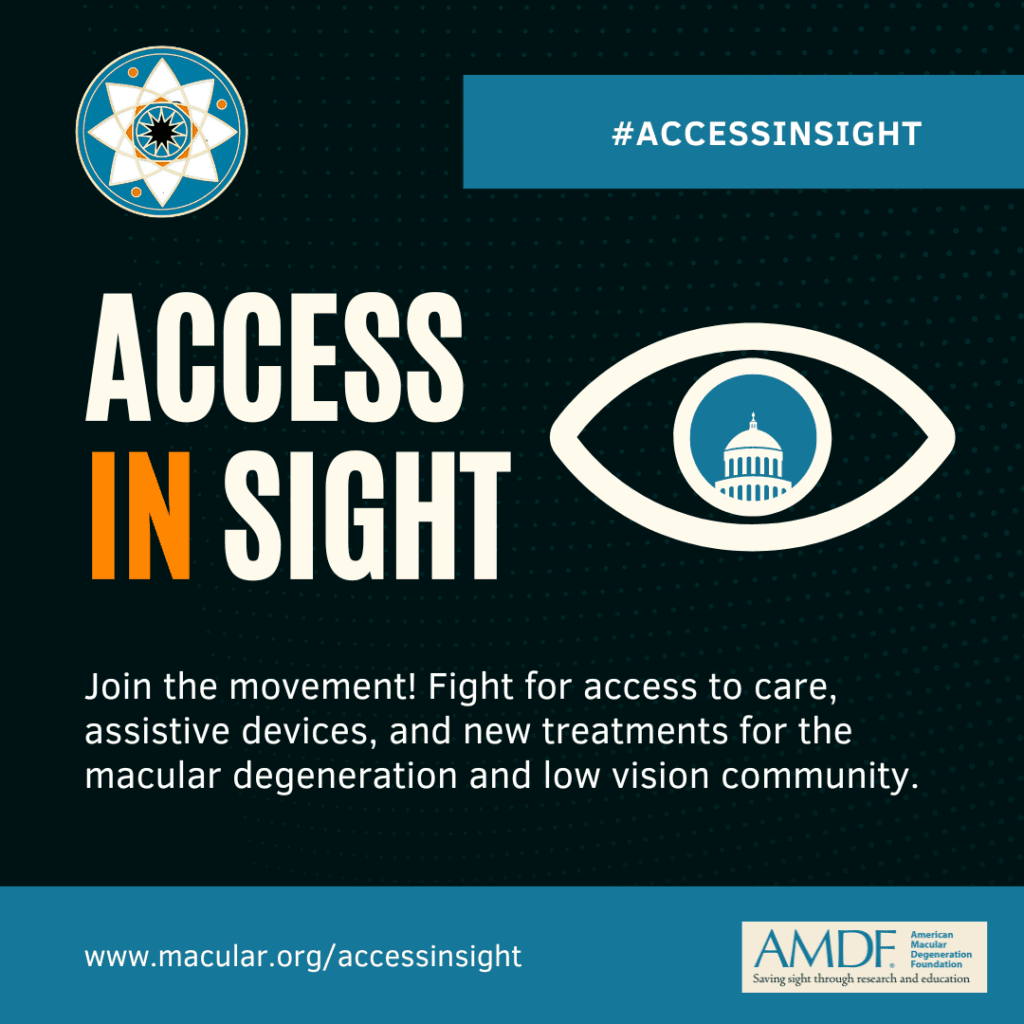
AMDF has declared the fourth week of February as Access in Sight! AMD/Low Vision Advocacy and Action Week, as part of the annual Age-related Macular Degeneration (AMD) and Low Vision Awareness Month every February.
2026 DATES: February 23-28
Access in Sight! AMD Advocacy and Action Week is a public call-to-action to bring the attention of policy makers and the public to issues that affect the daily lives of people with vision loss caused by macular degeneration.
Join us in advocating for research, and better access to care, services, and assistive devices for those affected by vision loss.
**Special note – we know that rapid changes to policies and institutions are underway. We are concerned with how this may affect in-progress research, and we will keep you informed as we learn more, and how you can help.
In 2026, we are asking Congress to:
Fund the National Eye Institute for Fiscal Year 2027 at $1 Billion, to match growing public health needs. We urge Congressional support to increase this funding in the FY27 appropriations requests.
Reject any future proposed consolidation of the National Eye Institute (NEI) by maintaining the NEI as a dedicated institute within NIH in FY27 appropriations.
Support access to low vision assistive devices and services by urging the Centers for Medicare and Medicaid Services (CMS) to rescind the Medicare “Low Vision Aid Exclusion” at 42 C.F.R. § 411.15(b).
Protect Vision and Eye Health Funding in FY 2027 appropriations by restoring the Vision Health Initiative at the CDC to $6.5M to allow them to complete their critical work in community-level eye health interventions, surveillance, and research.
Join the bipartisan Congressional Vision Caucus, whose members are dedicated to strengthening and stimulating a national dialogue around policies related to vision loss, blindness, and visual impairments or disabilities.
Let’s Focus Our Efforts
There’s power in numbers. Here’s what you can do.
On February 24, AMDF, in partnership with the National Alliance for Eye and Vision Research, will be in Washington DC to conduct in-person Hill visits to present our priorities to members of Congress and the Senate. At noon, we will hold a Congressional Briefing on the state of macular degeneration in the U.S.
ACTION NEEDED!
In advance of our arrival in DC on February 24, we need YOU to visit, call, and/or write in to your federal officials to tell them we’re coming, and to let them know you want them to pay attention, and particularly to attend the Macular Degeneration Congressional Briefing to be held at noon in Rayburn 2075.
Visit!
A visit to your senators’ and representatives’ local office is the most impactful action you can take. Take time to build a relationship, tell your story and explain why the policies that affect macular degeneration matter to you.


Write In!
Write in advance of our arrival in DC on Feb 24th to let them know we’re coming and you want their support on AMD issues! Click the yellow button below to customize a form letter from NAEVR, OR, write your own. Click here for information on who to write and how to contact them.
Call!
If you can’t visit, call! Or, follow up your email with a call! Click here to find the phone numbers to the representatives for your district. And then click the button below for a call script guide.

HELPFUL INFORMATION
WHICH OFFICIALS SHOULD YOU CONTACT AND HOW?
You want to contact your members of Congress. Your members of Congress are the individuals elected to represent you at the federal level in Washington, D.C. Congress is divided into two parts: the Senate and the House of Representatives.
Senators represent the entire state, while Representatives represent specific districts within the state. They are responsible for making laws, overseeing government spending, and addressing issues that affect the nation.
While your senators and representatives will mostly be in Washington, D.C., you can contact them via email, phone, and by visiting their local state office and speaking to the staff there. You can use the search tool at https://www.usa.gov/elected-officials. Enter your full address, then click the drop down for your “Federal Officials” and look for your senators and representative. To the right of their name is a + sign to drop down for more information. Click their respective websites, and look for the “Contact Us” information where you will find all relevant information to visit their local office, or to call or write.
TIPS FOR A SUCCESSFUL VISIT, LETTER OR CALL
- Be prepared: Research the legislator’s background or stance on the issues or any relevant legislation. Have they supported NIH in the past, or have they supported expanded healthcare legislation?
- Be clear and concise: Start with a brief introduction sharing your name, your zip code, and the reason for your contact (that you’re living with or impacted by AMD) and are asking them to support certain priorities.
- Personalize the message: The call script and form letter are guidelines but are customizable. We strongly encourage you to tell your story, and why AMD and vision loss are a priority for you.
- State your ask: the five key asks are outlined in both the letter and the call script. Make them clear and concise. If you disagree with any of the asks, customize the scripts as works for your priorities.
- Be friendly and respectful: This is not a political call, this is a policy call. This call is about the issues that are important for macular degeneration. Be respectful, say please and thank you’s, and offer to follow up with the office if they have any questions.
HELPFUL PRINTOUTS
The following printouts might also be helpful to you, especially for an in-person visit or phone call.
Congressional Briefing Invite Already Sent to all Congressional Offices
AMD Congressional Report
This Congressional Report, prepared by AMDF for 2026, will be given to all attendees of the Congressional Briefing. You can use this to better understand the issues we’ll be asking Congress to support, to guide your conversations, and even to print and leave behind with whoever you speak to during an in-person visit. Click the yellow button below to download.

